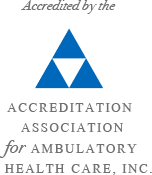Barrett's Esophagus Treatment in New York, NY

At Gramercy Park Digestive Disease Center, our talented and trusted gastroenterology specialists offer diagnosis and treatment for patients with Barrett’s esophagus. If you wish to learn more about this condition or are seeking treatment in NYC and the surrounding areas, do not hesitate to call 212-979-3237 today for a personalized consultation.
What is Barrett’s esophagus?
Barrett’s esophagus is a complication that emerges from repeated exposure to stomach acid, often as a result of gastroesophageal reflux disease (GERD). Patients with GERD experience repeated regurgitation of stomach acid into the esophagus. When this happens frequently and for a long period of time, it can result in changes to the cells that line the esophagus. Barrett’s esophagus is categorized by the damage and discoloration of the cells within the lower esophagus.
While most patients that develop Barrett’s esophagus have had GERD, only a small proportion of GERD patients develop Barrett’s esophagus. It is important to catch this condition in its early stages as it can develop into esophageal cancer if left untreated.
Why Early Detection is Important
Early detection of Barrett’s esophagus is important. Sufferers have a higher risk of developing cancer of the esophagus and other serious health complications. If you believe you may be suffering from severe GERD or Barrett’s syndrome, it is important to consult a gastroenterology specialist to evaluate your condition and begin Barrett’s esophagus treatment, if necessary.
How is Barrett’s Esophagus Diagnosed?
In order to diagnose Barrett’s esophagus, an upper endoscopy will be performed in order to view the lining of your esophagus. Your doctor may also opt to perform a biopsy during the endoscopy to further examine the tissues. During a biopsy, a pathologist determines the level of change that your cells have undergone. Changes in cells are called dysplasia, and treatment options for Barrett’s esophagus differ greatly depending on the level of dysplasia that is present.
Common Symptoms of Barrett’s Esophagus
If you experience any of the following symptoms of Barrett’s esophagus, it is important to consult a gastroenterology specialist at Gramercy Park Digestive Disease Center (GPDDC) for evaluation.
Symptoms of Barrett’s esophagus may include:
- Frequent heartburn
- Difficulty swallowing
- Upper abdominal pain
- Chest pain
- Dry cough
Who is at Risk For Barrett’s Esophagus?
Research shows that Caucasians, elderly people, and men are at the highest risk for developing Barrett’s esophagus. If you experience chronic heartburn or frequent acid reflux you are also at a heightened risk for developing the disease.
Treatment Options we offer for Barrett’s Esophagus
Depending on the damage and discoloration of cells in the esophagus, there are a variety of treatment options for Barrett’s esophagus. Both lifestyle changes and medication can help control acid reflux and prevent or decrease the effects of Barrett’s esophagus for patients with no dysplasia or very low dysplasia. In cases where Barrett’s esophagus is present but there are no drastic changes to the composition of the cells, your physician is likely to recommend periodic endoscopy exams every 1-3 years. In more severe cases of Barrett’s esophagus (high dysplasia) or in cases where conservative treatments are not effective, surgical options may be considered.
Lifestyle Changes:
Lifestyle changes may be appropriate for patients who have not yet developed Barrett’s esophagus or may be recommended in conjunction with other treatments.
Lifestyle changes may include:
- Avoiding laying down for at least 3 hours after eating
- Sleeping with your head elevated
- Making diet changes (avoiding foods that trigger acid reflux)
- Avoiding alcohol and tobacco
- Losing weight
Medications:
In addition to lifestyle changes to control Barrett’s esophagus, medications are sometimes recommended for patients who are experiencing no dysplasia or very low dysplasia.
Common medications used to control Barrett’s esophagus include:
- Antacids (regularize stomach acid)
- H2 blockers (block release of stomach acid)
- Proton pump inhibitors (lower stomach acid)
Restorative Tissue Treatments:
High levels of dysplasia are considered a precursor for esophageal cancer, and physicians usually recommend more invasive treatment options in these cases.
Procedures used to remove abnormal cells and restore the esophageal tissues may include:
- HALO radiofrequency ablation (RFA) RFA removes abnormal cells in the esophagus with radiofrequency energy using an endoscope.
- Photodynamic therapy (PDT) PDT removes abnormal cells in the esophagus with laser technology using an endoscope.
- Cryotherapy Cryotherapy removes abnormal cells in the esophagus with application of extremely cold temperatures (such as through the application of liquid nitrogen) using an endoscope.
- Esophagectomy Esophagectomy is a surgical procedure that involves removing most of the esophagus and attaching the remaining portion directly to your stomach.
What to Consider Before Surgery
When considering any procedure or surgery for Barrett’s esophagus treatment, it is crucial to find an experienced surgeon, as there are increased risks for complications involved with any major surgical procedure. Complications and risks associated with treatment of Barrett’s esophagus may include bleeding, chest pain, narrowing, or tearing of the esophagus, and nausea. If you begin to experience any of these symptoms after having treatment for Barrett’s esophagus, you should contact your gastroenterologist.
How Can the HALO Radiofrequency Ablation System Help with Barrett’s Esophagus?
HALO ablation technology uses heat to eliminate diseased tissue known as Barrett’s esophagus. By targeting only Barrett’s tissue, this minimally invasive procedure leaves healthy tissue undamaged. GPDDC uses the HALO 90 device to treat Barrett’s.
Schedule Your Barrett’s Esophagus Consultation In NYC!
If you believe you may be suffering from severe GERD or Barrett’s esophagus, the first step toward getting treatment is to consult a skilled NYC gastroenterologist. Gramercy Park Digestive Disease Center (GPDDC) is home to top board-certified gastroenterology specialists, with extensive experience in treatment for Barrett’s esophagus. Call (212) 979-3237 or use the form on this page to learn more about Barrett’s esophagus treatment options.


